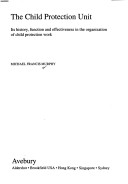This work reports empirical research on state intervention with children and families through the provision of substitute care. It explores the basis, process and outcomes of decisions of 294 children entering care using quaniitative and qualitative research techniques. It identifies factors associated with initial decisions to bring children into care, charts substitute care careers and illuminate administrative legal and policy issues surrounding child protection interventions. Pre and post placement circumstances of biological parents are examined to portray their perspectives on the origins of state interventions and care decisions, the impact of separation on them and links maintained with their separated children. Using "event history analysis" a prediction model to explain trends in placement breakdown and restoration is developed in the book.
The need to incorporate feminist, antipoverty, antiracist and empowerment approaches to practice is argued based on the inherent strucural disadvantage reflected in the preponderance of female headed single parent families whose children were taken into care, the over-representation of female children in the sample of children who remain in care, and the disproportionate number of Aboriginal children who entered care. Child welfare practice which values and sustains kinship networks, and which facilitates restoration or permanent forms of shared care is advocated given increased awareness of children's ecological context where issues of identity, continuity and partnership are integral to conceptualisations of good practice in legislation and policy.
- ISBN10 1859722105
- ISBN13 9781859722107
- Publish Date 12 July 1996
- Publish Status Out of Print
- Out of Print 2 March 2002
- Publish Country GB
- Publisher Taylor & Francis Ltd
- Imprint Avebury
- Format Hardcover
- Pages 322
- Language English
